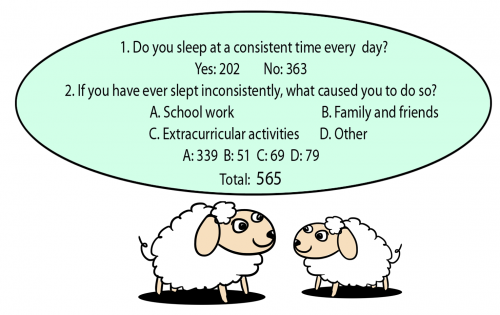Inconsistent Bedtimes Indicative of Health Problems
ANGELA YANG
Staff Writer
In a study conducted by the American Psychological Association, it was found that an infrequent and inconsistent sleeping schedule correlated with an increase in behavioral problems in children ages 2 to 5 years old because a consistent bedtime maintained the body’s internal clock and regulated the children’s behavior. The behavioral problems are all indicators on the Child Behavior Checklist for issues such as anxiety, depression, aggressiveness and hyperactivity.
To that end, sleep is vital to human bodies because it allows the body to rest and enrich healthy brain function which then improves learning and lowers the risk of obesity. A consistent sleeping schedule is particularly important to a healthy development in adolescents. Children and teenagers require sleep because it triggers the hormone that promotes normal growth and boosts muscle mass, according to the National Heart, Lung, and Blood Institute (NHLBI).
A consistent sleeping schedule has the same behavioral effect on adults as it does children. The NHLBI found that adults who are well rested and maintain a healthy sleeping schedule are often more productive and perform better during the day at work and school than those who are deprived of sleep.
Lack of sleep or inconsistent sleep can also result in the development of many health problems. It was found that sleep deprivation is often linked to running a higher risk of incurring obesity, heart disease, diabetes, a weaker immune system and a shorter life expectancy, as recorded by the Division of Sleep Medicine at Harvard Medical School. Furthermore, a study conducted by Brigham and Women’s Hospital reported that an inconsistent sleeping schedule conflicted with the body’s internal biological clock. Irregular sleep decreases the body’s resting metabolic rate, which lends itself to a higher possibility of weight gain and obesity.
Despite the health risks and behavioral problems associated with the lack of sleep and inconsistent rest, many find it hard to maintain a regular sleeping schedule due to numerous factors, many of which are associated with the fast-paced life of today’s society.
The Sleep Health Foundation reported that some of the many reasons behind an inconsistent sleeping schedule included excessive caffeine, jet lag and stress. On the other hand, those who do maintain a regular sleeping schedule find that an interruption in said schedule disrupts them.
“I have a pretty consistent sleeping schedule and when I’m not consistent, I fall asleep in class,” freshman Kelly Huang said.
For others, the change in sleeping schedule does not affect class behavior, but rather their mood. Sleep and mood are also closely connected, as disclosed by the Division of Sleep Medicine. A poor sleeping schedule leads to irritability while a healthy sleeping schedule strengthens the human body.
“When I have to stay up to do homework I will be hyper for the first few hours; after that I’m really tired and maybe a little grumpy,” sophomore Amy Leung said.
